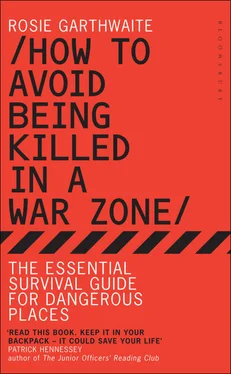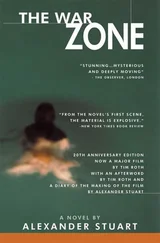‘So what should you do if you happen to stumble across what you believe to be an IED? First, stay calm. If it hasn’t actually exploded, don’t do anything to it. Simply retire to a safe distance and take others with you, making sure there isn’t another IED where you move to. Report your findings and stay back.
‘Remember, IEDs are indiscriminate and your best chance of identifying a threat is by knowing who the perpetrator is trying to target and then making sure you don’t present yourself as that target.’
The threat from chemicals, radiation spillage and depleted uranium can also be high in war zones long after the battles are over.
BBC correspondent Caroline Hawley advises: ‘Be aware that hazards can lurk where you’re not expecting them. I still regret not being better prepared for a visit to Iraq’s nuclear site at Tuwaitha, which was extensively looted just after the war that toppled Saddam Hussein. People living in the area had taken away barrels used for storing uranium, tipping the ‘yellow cake’ out first so that they could use them to store rice and water. They were becoming ill and wanted international help. As we filmed on the site with an Iraqi armed with a Geiger counter, the needle of the machine suddenly pinged past its highest reading and the man shouted, “Off scale!” As a dusty wind blew, laden with I hate to think what, we jumped back into the car and covered our faces with scarves. Call me a hypochondriac, but I have always worried that future health problems might be traced back to that former nuclear site.’
Avoiding contamination
Ask around locally to find out which are the danger areas. Avoid poking around blown-up vehicles, as they could be covered in depleted uranium. Don’t be afraid to use protective clothing and masks yourself, even if the locals don’t use them.
Treating contamination
If you think you have been contaminated, avoid touching your eyes and face with hands. You need to take off your clothes and shoes before you enter your house or hotel and rinse yourself thoroughly under cold running water. Don’t use soap unless the contamination is of an oily consistency. You will need to call for new clothes. Put the ones you were wearing in a plastic bag and throw them away as they might contaminate other items, or even the water supply if you wash them. If you were wearing protective clothing, throw it away in a plastic bag, writing some kind of warning on the bag in the local language.
/EXPERT ADVICE AND FURTHER READING
For further advice on chemical contamination you can call the following companies:
Avon Technical Products:+44 1225 896 375
Remploy:+44 151 631 5017
Sema:+33 147 819 521
Before going out in the field, it is strongly recommended that you read the UN Landmine and UXO Safety Handbook , available as a download from ngosecurity.googlepages.com/UN_Landmine_UXO_Safety_Handbook.pdf. It will provide you with accepted good practice for safer operations in landmine-affected states.
You can be the most experienced journalist in the world, but the minute you stop caring about what you are doing, you have to stop.
Shelley Thakral
13/ Surviving a Kidnapping
Be prepared to smile into the faces of your kidnappers and agree enthusiastically with their ideas. But you must also be prepared to kill them if necessary. You owe them nothing.
James Brandon
I have never beenkidnapped, but I have been an outside force working to get someone released.
I’ll never forget waking up one Friday morning to a message from a friend: ‘James has been kidnapped in Basra.’ It was the height of the hostage-killing season in Iraq, late 2004, and I’d just learnt that a few days after I’d left my former house, also in Basra, a group had come and kidnapped the housekeeper. He was a university student I had lived every moment with for five months. His father, an unemployed fisherman, cleared out his life savings and more to get his son back. The kidnappers had been looking for me. I was full of guilt.
James Brandon hadn’t been taken by the ad hoc groups we saw on telly every day. Instead, it was the increasingly dangerous and well-organized Shia militia who had stormed his hotel in the city of Basra, beaten him up on camera and then dragged him off without a word about their demands. The pictures of his violent seizure were made public, but the British Foreign Office wanted to keep his kidnapping quiet.
Choices, choices, urgent choices to be made. Do we – his friends with contacts across Iraq – stay quiet as recommended by the Foreign Office, or go large, make him front-page news? Against the advice of the experts, we decided to go public. Our aim was to get a renegade ‘enemy of America’ Shia cleric – the infamous Moqtada al Sadr – to stand up at Friday prayers and ask the kidnapping group, who claimed allegiance to his Mehdi army, for James’s release.
I ran to the BBC newsroom – not such an effort since I was working on the same corridor – tapped on a reporter’s shoulder and told her the story. The BBC crew then jumped into action. Three hours later James’s bruised and battered face was plastered all over the afternoon edition of London’s Evening Standard newspaper.
The story was out. James’s value as a hostage was up, but so was the danger to the kidnappers. All the stakes were higher. It was a risky gamble, but it worked. Moqtada al Sadr called for the group to release James, and some days later he was freed. We were lucky and so was he.
Terry Waite became famous for his work in helping to negotiate the release of hostages in the early 1980s, then he became one himself. Held for five years in Lebanon, most of it in isolation, he explains that advance preparation isn’t really possible, but you must do everything in your power to remain strong.
‘Having worked for several years as a hostage negotiator, I was always aware that one day things might go wrong and I would either be captured or, worse still, killed. The first thing to say is that if one is captured, nothing can really prepare one for the experience. I had secured the release of many hostages and listened to their stories, but when eventually I was captured I had to learn, and learn pretty quickly, how to manage.
‘Each situation is different, but probably a good rule of thumb is to remember that when one is captured it is likely that the captors will be excited and nervous, so one must be aware of making sudden movements that might cause one of the group to pull a trigger. You want to preserve your life, so it is wise to be compliant.
‘Once under their control, keep your wits about you. Listen carefully to what is said and remember it if you can. If you are blindfolded, listen for sounds around you so that at a later date it might be possible to locate where you were kept. Remember smells too.
‘Treat your captors with respect. Being aggressive will not help you. There is no need to be unduly submissive, but remember that at this stage they have most of the cards, and until you have a better idea of who they are and what they want, you had better go along with what they request.
‘If they require you to write a message, introduce into that message a deliberate mistake that only your immediate family might know. This will convey to those outside that you are speaking under duress.
‘It is essential at all times that you maintain your self-respect. This is where those who have had military training ought to have a slight advantage as they will have been taught to keep themselves smart. I was in captivity for five years, four of which were in strict solitary confinement, and for the first week, when I had my own clothes, I put my trousers under my mattress on the floor to keep them pressed! My captors thought I was mad, especially when I requested shoe polish. After a week my clothes were taken from me.
Читать дальше




![Джонатан Димблби - Barbarossa - How Hitler Lost the War [calibre]](/books/385421/dzhonatan-dimblbi-barbarossa-how-hitler-lost-the-w-thumb.webp)







